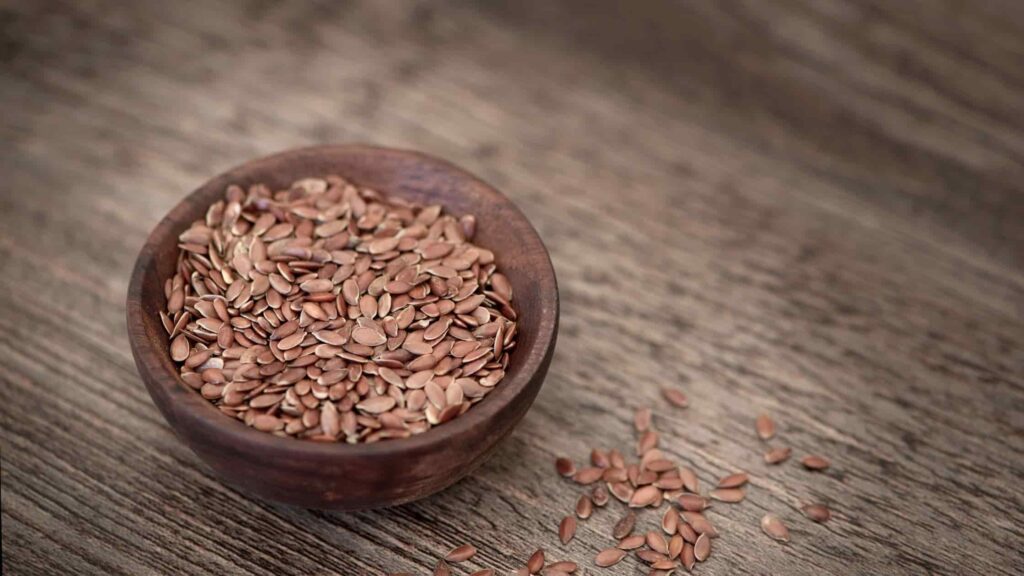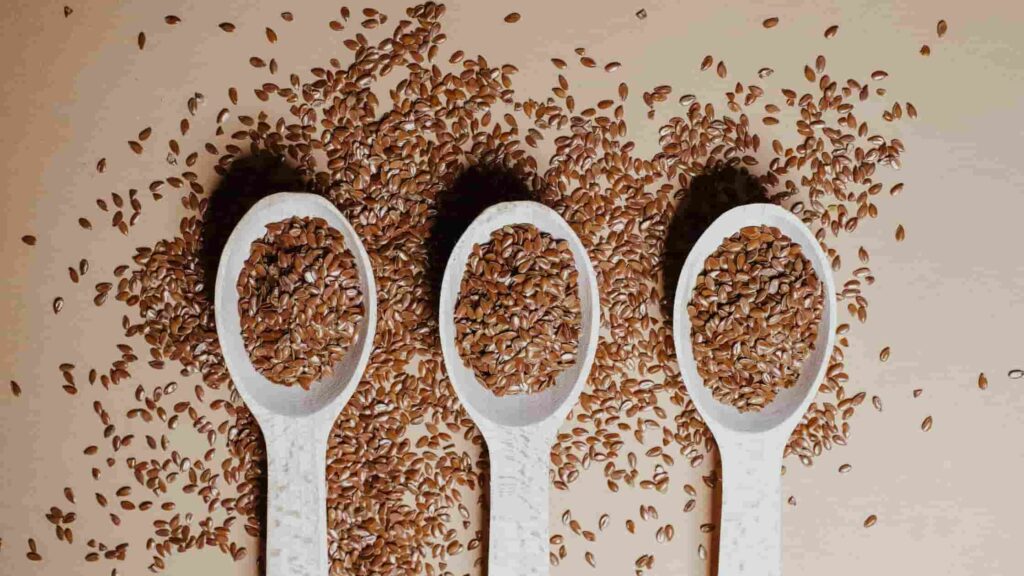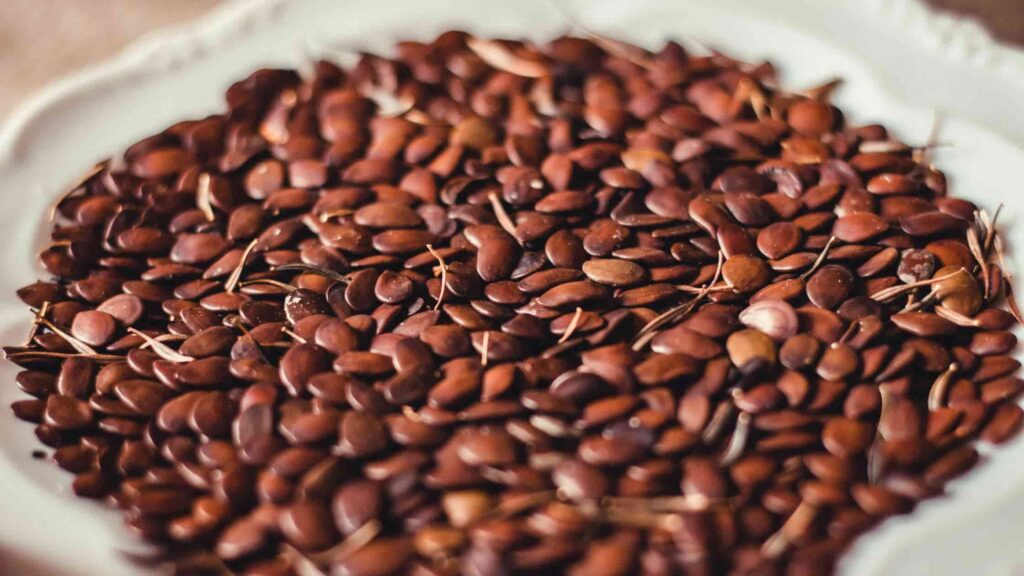I started adding ground flaxseed to my morning smoothies, and within two weeks, I noticed improved digestion and less bloating. It’s now a simple, daily habit that keeps me feeling lighter and more energized.
Flax seed is a nutrient-rich superfood packed with omega-3 fatty acids, fiber, and lignans that support heart, digestive, and hormonal health. It’s commonly used in ground form for better absorption and added to smoothies, cereals, or baked goods.
In this article we discuss about “Flax Seed”
Table of Contents
Flax Seed, An Ancient Crop Turned Modern Superfood:
Flax seed, also known as linseed, is one of the oldest cultivated crops in human history. While once used primarily for linen and oil, flax seeds have re-emerged in modern times as a superfood rich in nutrients, plant-based omega-3s, and fiber.

With countless studies highlighting their health-promoting benefits, flax seeds have become a staple in health-conscious diets around the world.
What Are Flax Seeds?
The tiny, brown or golden seeds of the flax plant (Linum usitatissimum) are known as flax seeds. They have a somewhat nutty flavor and can be taken whole, ground (milled), or as oil. Because the tough outer shell of whole flax seeds frequently passes through the digestive tract undigested, ground flax seed is thought to be the most effective form for nutrient absorption.
Alpha-linolenic acid (ALA), an omega-3 fatty acid, and lignans, a potent class of plant compounds that act as antioxidants, are abundant in these seeds. Flax also contains both soluble and insoluble fiber, making it a comprehensive food for cardiac, digestive, and metabolic health.
Nutritional Composition of Flax Seed:
Despite their small size, flax seeds are packed with nutrients. A typical tablespoon of ground flaxseed, or roughly 10 grams, offers the following benefits:
- Calories: 55
- Protein: 1.9 grams
- Carbohydrates: 3 grams
- Fiber: 2.8 grams
- Fat: 4.3 grams (mostly omega-3 fatty acids)
Key Nutrients Found in Flax Seed:
- An essential omega-3 fatty acid is alpha-linolenic acid (ALA).
- Lignans – Powerful phytoestrogens with antioxidant activity
- Thiamine, or vitamin B1, supports metabolic and neurological function.
- Magnesium: Vital for heart, neuron, and muscle health
- Phosphorus – Helps maintain bone and tissue strength
- Copper & Molybdenum – Important for enzyme function and iron metabolism
Health Benefits of Flax Seed:
1. Heart Health Support:
Flax seeds are one of the greatest plant-based sources of ALA, which has been associated to a lower risk of heart disease. Research indicates that flax can help:
- Lower LDL (bad) cholesterol
- Reduce blood pressure
- Improve arterial function
- Decrease inflammation and oxidative stress
In one study, participants who consumed 30 grams of flaxseed daily experienced a 10 mm Hg drop in systolic blood pressure, a significant improvement linked to lower stroke and heart disease risk.
2. Aiding Weight Loss Naturally:
Soluble fiber, which is abundant in flax seed, gives the gut a gel-like consistency. This lowers hunger and calorie intake throughout the day, delays digestion, and improves fullness.
- Soluble fiber binds with water to form bulk in the stomach.
- Promotes the release of appetite-regulating hormones like peptide YY.
- Aids in fat metabolism and lessens sugar cravings.
A review of over 45 studies found that flaxseed helped reduce body weight, waist circumference, and BMI, especially when consumed for 12 weeks or more at doses above 30 grams/day.
3. Blood Sugar and Diabetes Control:
Flax seeds’ high fiber and fat content makes them a low-glycemic food. They assist:
- Stabilize post-meal blood sugar spikes
- Improve insulin sensitivity
- Reduce fasting glucose levels in type 2 diabetics
Over the course of one to two months, diabetic individuals who took 10 to 20 grams of flaxseed powder daily saw blood sugar decreases of up to 19.7%.
4. Powerful Cancer-Fighting Compounds:
- Flax is rich in lignans, which have antioxidant and estrogen-modulating qualities. These substances have been investigated for their ability to:
- Lower the risk of cancers linked to hormones, such as ovarian, prostate, and breast cancers
- Inhibiting tumor growth in animal and test-tube studies
- Lowering circulating sex hormone levels in overweight women
Flaxseed contains up to 800 times more lignans than most other plant foods.
5. Digestive Health and Regularity:
Each tablespoon of flax seed provides nearly 3 grams of fiber — both soluble and insoluble — which supports a healthy gut in several ways:
- Insoluble fiber adds bulk to stools and relieves constipation
- Soluble fiber feeds beneficial gut bacteria, supporting the microbiome
- Helps with irritable bowel syndrome (IBS) and bowel regularity
Studies show flax seed can relieve both chronic constipation and diarrhea by improving stool consistency.
6. Hormonal Balance and Women’s Health:
Flax lignans have phytoestrogenic properties, meaning they mimic estrogen in the body. This can help:
- Balance hormones in perimenopausal and postmenopausal women
- Reduce menstrual breast pain (mastalgia)
- Lower risk of estrogen-driven cancers when consumed moderately
How to Add Flax Seed to Your Diet:
1. Forms of Flax Seed:

- Whole seeds – Must be chewed thoroughly; often used for visual appeal or texture
- Ground (milled) flaxseed – Best for digestion and nutrient absorption
- Flaxseed oil – Rich in omega-3s, ideal for salad dressings but not for cooking
- Flaxseed powder/capsules – Convenient supplementation form
2. Easy Ways to Use:
- Stir into oatmeal, cereal, or yogurt
- Blend in smoothies or protein shakes
- Bake into muffins, breads, or pancakes
- Use as a vegan egg replacement (1 tbsp flax + 3 tbsp water)
3. Recommended Daily Intake:
- General health: 1–2 tablespoons (10–20 grams) daily
- Heart & weight support: Up to 30 grams daily
- Always drink plenty of water to avoid digestive discomfort
Side Effects and Safety Precautions:
While flax seed is generally safe, excessive intake or improper use may cause side effects:
1. Possible Side Effects:
- Bloating and gas when consumed too quickly
- Allergic reactions (rare)
- Increased bowel movements
2. Special Warnings:
- Pregnancy and Breastfeeding: Flax contains estrogen-like compounds. High doses may affect fetal development. Limit intake during early pregnancy.
- Hormone-sensitive conditions: Consult a doctor before use.
- Unripe/raw flax: May contain toxins — always use food-grade flax seed.
Interactions with Medications:
Flax seed may interfere with:
- Diabetes medications (can cause hypoglycemia)
- Blood pressure medications (can enhance effects)
- Estrogen therapy (may alter hormonal effects)
- Anticoagulants (blood-thinning risk)
- Antibiotics (gut flora disruption reduces lignan effectiveness)
Flax Seed vs. Chia Seed: Which Is Better?
| Feature | Flax Seed | Chia Seed |
| Omega-3s | High in ALA | Also high, slightly higher |
| Lignans | Very high | Low |
| Protein | Moderate | Slightly higher |
| Calcium | Lower | Higher |
| Cooking Use | Mild nutty flavor | Tasteless, easy to mix |
Both are powerful superfoods, but flax seed offers higher antioxidant benefits through its lignan content.
Ground Flaxseed:
Ground flaxseed is easier for the body to digest than whole seeds, allowing you to absorb more nutrients. It’s a rich source of omega-3 fatty acids, lignans, and soluble fiber, which support heart health, digestion, and cholesterol control. Add it to smoothies, oatmeal, or baked goods for a nutritious boost.
Flaxseed for Hair:
Rich in antioxidants, omega-3 fatty acids, and vitamin E, flaxseed nourishes hair follicles, encourages development, and lessens hair thinning. Flaxseed gel or oil is a natural solution for vibrant, healthy hair since it can enhance scalp health, lessen dandruff, and give shine to lifeless hair.
Flax Seeds Benefits for Female:
Flax seeds offer unique health benefits for women, especially due to their high lignan content, which mimics estrogen and may help balance hormones.

Regular intake may ease menstrual discomfort, support reproductive health, and reduce menopausal symptoms. They also aid in skin health, digestion, and heart wellness.
Frequently Asked Question:
1. What does flaxseed do for females?
Flaxseed promotes menstrual health, aids in hormone balance, and may lessen menopausal symptoms. Additionally, it contains a wealth of nutrients that support heart, hair, and skin health.
2. What is the biggest disadvantage of flax?
The high fiber content may cause bloating or gas if consumed too quickly. It can also interfere with hormone-sensitive conditions in some people.
3. How to eat flax seeds for females?
Women can add ground flaxseed to smoothies, yogurt, or oatmeal. Aim for 1–2 tablespoons daily for hormonal and digestive support.
4. What is the Desi name for flaxseed?
In South Asia, flaxseed is commonly known as “Alsi” or “Tisi” in Urdu and Hindi.
5. Is flaxseed good for hair?
Yes, flaxseed contains omega-3s and vitamin E that strengthen hair, reduce breakage, and promote healthy growth.
6. Is flaxseed good for skin?
Flaxseed helps keep skin hydrated, reduces inflammation, and may improve skin elasticity due to its omega-3 and antioxidant content.
7. Can we eat seeds at night?
Yes, eating seeds like flax at night may aid digestion and improve sleep, especially due to their fiber and magnesium content.
8. Can we eat flax seeds directly?
Although they are more difficult to digest, whole flax seeds can be consumed. Ground flaxseed is more advantageous and better absorbed.
9. Do flaxseed have side effects?
Some people may experience bloating, gas, or allergic reactions. Excess intake can also interfere with medications or hormone therapies.
10. How to eat flax seeds to reduce tummy?
Mix 1 tablespoon of ground flaxseed in warm water or smoothies daily. Its fiber content helps reduce belly fat by boosting satiety and digestion.
11. Why shouldn’t men take flaxseed?
Some research suggests flaxseed’s phytoestrogens may affect testosterone, but moderate intake is generally safe. Consult a doctor if concerned.
Conclusion:
Flax seed stands out as a powerful superfood with a rich nutritional profile and wide-ranging health benefits. From improving digestion and heart health to supporting hormonal balance and enhancing skin and hair, its impact is well-supported by both science and experience. Whether you’re aiming for better wellness, weight control, or natural remedies for chronic issues, incorporating ground flaxseed into your daily diet is a simple and effective step toward a healthier lifestyle.
Read More:
- Stevia Powder, The Natural, Zero-Calorie Sweetener You Need to Know
- Pumpkin Seed—Complete Guide to Benefits, Nutrition, and How to Eat Them!
- Moringa Powder—A Complete Guide to Benefits, Uses, Side Effects & Nutritional Facts
- Chia Seeds—A Complete Guide to Benefits, Nutrition, and How to Use Them
